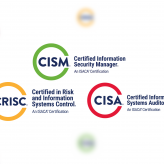

Interview with the winner of our ITIL® 4 Foundation course
29. 9. 2022
Kristina Lipovská is not only a headhunter, but also a recent winner and graduate of our ITIL® 4 Foundation course. Especially because of her background and entry into the world of IT, we decided to interview her.
Why should we keep educating ourselves in new industries? How to best prepare for ITIL® 4 Foundation training as a newbie? And what is it like to be a woman in IT? Kristina will answer these questions in the interview and we hope that she will inspire you for self-development and getting further education.
Can you briefly introduce yourself? What field do you currently work in and how did you get into this job?
My name is Kristína Lipovská, I am from Bratislava and I have been working at SAM International for 10 years as a Headhunter and Consultant for the Czech and Slovak markets. I got to SAM International by approaching its owner, saying that for family reasons I would like to work differently – more flexibly (In 2011, home offices and flexible working hours were not as widespread as they are today) and that I was looking for a smaller group. In my previous job, I was an Ombudsman/Manager for communication with clients in an international bank, which was an extremely interesting job, but demanding on time, energy, knowledge and communication.
What was the biggest motivation for you to become interested in IT and what are your ambitions in this industry?
The desire to penetrate more into IT has been with me for a long time, and there were and are several motivators. The closest motivator is my husband, who works as an IT admin. Many of his knowledge and experiences help me a lot, but on the other hand, they hold me back a bit. How is it possible that the presence of an “own” IT admin can be a hindrance? It happened to me that instead of installing the program myself or setting up the environment, I entrusted it to my husband and thus impoverished myself with experience and the ability to know something like this in the future. On the other hand, however, I am very grateful for safety lessons on how to behave on the Internet, without resistance I accept restrictions even at the expense of user comfort.
My work motivates me a lot and since I need to be a discussion partner as a client as well as a candidate, I have to constantly learn. My ambition is not to know everything and completely in-depth (which is not even possible), but to have a general overview of IT, to understand the context and to know how to ask the right questions (which is the biggest challenge in my opinion – to be able to ask the right question at the right time) .
You recently graduated from the IT education program for women MiniTech MBA. How have it helped you?
The most important realization after studying the MiniTech MBA was that IT is not an enchanted landscape, available only to the chosen ones. I really liked that the education focused on a general overview of information technology. This is how I acquired and deepened some digital skills. During some lessons I said to myself that this is something I would like to study more in depth. And I also confirmed that you need to keep learning, because what you know today may not be enough for what you will do tomorrow.
As a Mini Tech MBA participant, you won our ITIL® 4 Foundation course. Have you heard of ITIL or ITSM before taking the course?
I honestly admit that I have not heard of ITIL or ITSM, but as soon as I received the introductory information, I immediately went to look for the necessary information and even asked acquaintances if they knew anything about this course and what they thought about it. The reactions were positive and great especially in that everyone independently agreed how the knowledge gained from ITIL can be used in practice.
What did the course give you and what did it make you think about? Were there any difficulties during the training?
Before starting the course, I was a little worried about the extent to which I would understand the concepts and definitions, but after a few minutes it became clear to me that the lecturer Franta not only lectures, but is mainly interested in us understanding the new information as best as possible and combining them with what we already know. For me, it was an insight that I already use many principles or “best practices” in my work, or i used I really liked the fact that ITIL gives suggestions on how activities can be carried out, but does not dictate that it must be exactly as suggested. A few weeks after the course, I worked on a project where I actively used the acquired knowledge, I knew where to look for specific “best practices” and I just checked that I remembered correctly how the given process was defined. So, the practical effect of the course manifested itself very quickly in everyday life.
What would you do differently now if you were to take the course again?
If I were to go to the course again, I might consider the face-to-face format (not online), because of the more significant interaction with the lecturer and other participants. I would also spend more time studying for the exam and that (in my particular case) due to the fact that I don’t have a very good mechanical memory and the exam somewhat required exact citations and definitions in the answers.
How many women were on the course with you? How do you feel about the representation of women in IT in general?
If I remember correctly, as regards the number of women and men, we were equally represented in the group (3:3). However, the representation of women in IT in general is something else, men still predominate there. I am glad that the social attitude is gradually changing, that there are non-profit organizations and commercial companies that organize courses for women, but also girls, that help them discover the world of IT and encourage them not to be afraid to break down the prejudices that women into IT they don’t belong.
You are not completely unfamiliar with the HR industry. Do you think that companies should take care of employee education?
I am convinced that if the company cares about its employee, then in addition to the salary, it should provide him with the conditions for education, either by paying for the selected course/training, or by providing the employee with an educational budget and letting him him to use as he sees fit. If this is not possible, either because the company has limited resources or prefers education in other areas than the employee wants, then I definitely recommend not giving up and looking for other options (you can ask for a partial contribution and pay the rest yourself).
On behalf of the EDU Trainings team, we thank Kristina for the interview and wish her further career success and newly acquired knowledge.



